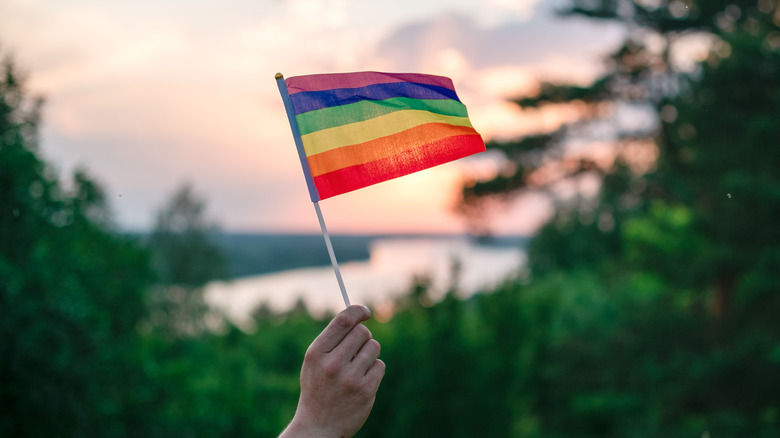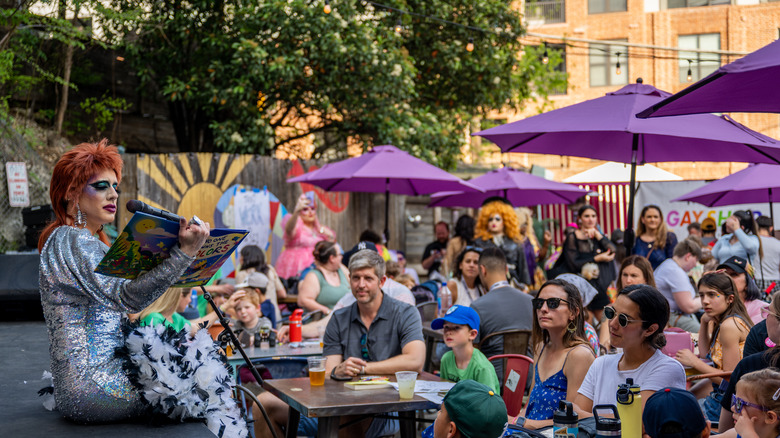How To Support The LGBTQI+ Community Beyond Voting
As anti-trans legislation continues to mount across the United States, many are wondering what they can do to support trans people, trans rights, and the LGBTQI+ community at large. As Vice reports, the past five years has seen 33 US states produce legislation that aims not to simply curtail, but eliminate many LGBTQI+ protections in their entirety. Some states have passed anti-trans legislation that, for example, prohibits children from using the school bathroom that corresponds with their gender identity, while others are pushing for rigid censorship of LGBTQI+ topics in schools and limited sex education. Other locales have introduced bills that would limit access to gender-affirming health care and eliminate protections from discrimination, while others are throwing topics like free speech into legal precarity by banning LGBTQI+ art forms like drag from public spaces.
Since many of these bills are happening at the state level, watching from miles away can leave one feeling helpless. It's tempting to believe that electing the right representatives will be enough. But while voting is indeed crucial, it's important to remember it isn't the end-all, be-all solution to fighting for and protecting LGBTQI+ rights. Plus, if you don't live in a state where these laws are being enacted, or if you're in a place where voting isn't accessible, making a difference at the ballot box isn't an option. Luckily, there are several other actionable ways you can show up for the LGBTQI+ community, no matter where you are.
Contact state legislators about anti-LGBTQ laws
One of the easiest, but most effective ways to advocate for LGBTQ+ rights is to speak out about them. The American Civil Liberties Union (ACLU) keeps a state-by-state map of anti-trans and anti-LGBTQ legislation across the United States where you can learn the details of each bill and track how it is progressing through the state legislature. Make your voice heard by reaching out directly to your senator or state elected officials and encourage them to vote against harmful laws or express preemptive support for the expansion of LGBTQ+ rights where they have not yet been fully realized. Not sure what to say? No problem. Organizations like Freedom For All Americans, provide helpful scripts for what to say if you're reaching out to officials over the phone or email. If you're not sure where to find the contact info, The National Center for Transgender Equality website allows you to easily submit a form email to lawmakers and ask them to oppose specific bills. Don't forget to also share information you learn about new laws or petitions with friends and family to get others involved with the fight, too.
It may seem like a small action for an individual, but when a senator receives thousands of calls from different people, it can demonstrate how urgent these issues are and remind them they are being held accountable.
Get involved with mutual aid
Unlike charity, mutual aid allows you to play a more active role in creating support systems for vulnerable communities. Often, these funds assist in paying for necessities such as housing, utilities, and groceries, along with legal fees, medical bills for affirming surgeries, or whatever emergency events may have surfaced. This type of assistance can be life-changing, because along with the barrage of harmful legislation being introduced, LGBTQ people all over the US already face numerous issues impacting their day-to-day lives, including extreme poverty at a rate far greater than the rest of the United States and lack of access to adequate health care.
Some examples of funds you can give to include Third Wave Fund, a New York based organization that provides grants to grassroots projects advocating for justice. The Trans Housing Coalition, meanwhile, specifically provides assistance to trans people who have been displaced from their homes. The Queer Food Fund, meanwhile, helps to provide financial assistance for LGBTQ+ folks facing food insecurity. These are of course not the only funds that exist, and if you want to learn more about funds in your area, refer to your LGBTQ+ organizations in your area for more info. Folks in San Francisco, for instance, can find a list of LGBTQ+ specific mutual aid funds on The Queer Culture Center website. And even if you don't live near a major city, you can start your own fund by consulting Representative Alexandria Oscasio-Cortez's Mutual Aid Fund Guide.
Show support for local LGBTQ+ initiatives and events
While giving money to national platforms like GLAAD and the ACLU allows you to support others fighting for change, one of the most effective strategies for making a difference in the lives of actual people is to take action locally. Instead of waiting for a presidential or congressional election, make a point to participate in local elections and attend community board meetings to spread awareness of LGBTQI+ efforts happening in your city. In places, where "Don't Say Gay" school bills are being proposed, making your voice heard is crucial. If you have the time, you can take things a step further apply to join a community board, where you can have a greater influence on ensuring LGBTQ+ issues are addressed.
Your efforts don't have to always involve direct politics, either. Show your solidarity with the community by loudly and proudly supporting LGBTQI+ art through attending events like drag shows or LGBTQ+ art showcases. Hosting a Drag Story Hour, for instance, provides the opportunity for people of all ages to engage with LGBTQI+ folks. You can also consult The Trevor Project for information on how to set up your own online and in person fundraiser to raise money for different causes, like mental heath support for transgender youth. Keep in mind, these efforts should go beyond Pride Month if you really want to show up for the community in a meaningful way.



